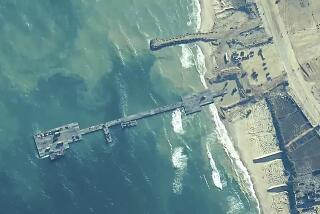Mail for U.S. Troops Floods Desert Bases : Military: The GIs love it, even if postal clerks don’t. Over 100,000 pounds arrive each day.
DHAHRAN, Saudi Arabia — They are working around the clock on 12-hour shifts, and still they can’t catch up. The mail keeps arriving in Volkswagen-sized cardboard containers and bright orange bags, over 100,000 pounds daily for America’s men and women who will spend Christmas in the Arabian desert.
At the 1241st Postal Company, the loading dock is piled head-high with the orange bags marked “priority mail.” The unit’s more than 120 postal workers have a hard time keeping up with flights, and at times the parking lot beyond the dock is so filled with mail there is no room for vehicles.
Veteran sergeants here say they cannot remember such an outpouring of support for soldiers abroad; many of the letters are addressed to “Any Soldier.” They speculate that some of it may stem from a residue of guilt over the Vietnam era, when Americans did not embrace the nation’s fighting men the way they had in other wars.
“Next to bullets, mail is the most important thing in the Army,” said the 1241st’s commander, Capt. Larry Bullock, a reservist who was director of a vocational school before the gulf crisis.
In fact, for soldiers at both the front and the rear, mail call rates just ahead of a hot meal as the biggest morale booster of the day. It is the soldier’s antidote for loneliness, boredom and fear.
Even in the most forward units, mail is delivered at least once a day, usually about two weeks after it is posted in the United States. In addition to family and friends, it comes from letter-writing campaigns organized by civic clubs, schools, community organizations and veterans’ groups.
“I’m getting packages from people I don’t even know,” said Lt. Brent Frazer of Swanzey, N. H., at a Patriot missile site. “How they got my name I don’t have the vaguest idea.”
Many of the Christmas packages contain snacks and toiletry items that are readily available to the soldiers. “We’re awash in junk food,” said one Leatherneck, not unhappily. Other packages contain hard-cover books, tape decks and bulky gifts that troops constantly on the move can neither carry nor ship back home.
“I’ll bet we get a hundred letters a day addressed to ‘Any Soldier’ in just this unit,” said Sgt. Brad Mitzelfelt of Los Angeles at a forward Marine position. “I’ve started exchanging letters with a 15-year-old boy who’s really interested in aircraft. He updates me on the news. Naturally, I’ve heard it already, but he thinks we’re not getting any news at all out here.”
A Saudi Arabian customs official spot-checks mail arriving in the country, but except for an occasional bottle or two of liquor--treats which usually arrive broken--and confiscated Playboy magazines, the Saudis’ cultural sensitivities have not been offended.
The biggest problem caused by the troops is their penchant for mailing home souvenirs of sand, which can disable automated postal sorting machines in the United States.
The volume of mail has become so huge in Saudi Arabia that a new igloo-like APO--or military post office--is being built in the desert outside Dhahran. The 1241st is one of four postal companies and 12 APOs, or zip codes, assigned to Operation Desert Shield.
“After 12 hours here, you’re blurry eyed. The last thing you want to do when you get off duty is write letters, but I do,” said Sgt. Patricia Walton, whose parents, two children and eight brothers and sisters back in Greensboro, N. C., receive a steady stream of letters from her.
More to Read
Sign up for Essential California
The most important California stories and recommendations in your inbox every morning.
You may occasionally receive promotional content from the Los Angeles Times.










